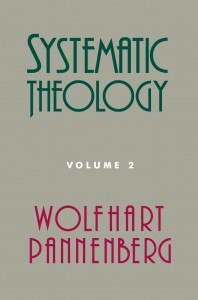Pannenberg: The Cross & Resurrection
The resurrection effectively reversed the charges against Jesus and confirmed his mission. We thus see that if he had saved his life at the cost of his proclaiming the divine lordship, he would have actually made himself independent of God and put himself in equality with him. ‘Whoever would save his life will lose it’ (Mark 8:35 par.). This was true of Jesus himself. He could not be the Son of God by an unlimited duration of his finite existence. No finite being can be one with God in infinite reality. Only as he let his creaturely existence be consumed in service to his mission could Jesus as a creature be one with God. As he did not cling to his life but chose to accept the ambivalence that his mission meant for his person, with all its consequences, he showed himself, from the standpoint of he Easter event, to be obedient to his mission (Rom. 5:19, Heb. 5:8). This obedience led him into the situation of extreme separation from God and His immortality, into the dereliction of the cross. The remoteness from God on the cross was the climax of his self-distinction from the Father. Rightly then, we may say that the crucifixion was integral to his earthly existence.
— Wolfhart Pannenberg, Systematic Theology, Volume 2. (1991) pp. 374, 375.
God as the Great AntiTyrant
 I begin this post by calling attention again to a quote I posted on tbis blog previously. It is from the second volume of Wolfhart Pannenberg’s Systematic Theology.
I begin this post by calling attention again to a quote I posted on tbis blog previously. It is from the second volume of Wolfhart Pannenberg’s Systematic Theology.
But, I need to give it a little context. Pannenberg is saying that the idea that humans have a special place in the world because of their rationality has pre-Christian origin. He mentions Cicero’s statement of this idea. He goes on to say:
Yet, Cicero did not link this dignity, as modern usage does, to the idea of the inviolability of human life in each individual. This thought arose only with the idea that we are under a supreme authority that releases us from obligation to other powers, and especially from being controlled by other people or by society. Rightly, then, the Christian tradition sought the basis of personal dignity in our creation in the image of God. Our destiny of fellowship with God forms the indispensable premise of the function of human dignity as the content of a supreme legal principle and a basis for individual human rights, e.g., in modern declarations of such rights.
— Systematic Theology, Volume 2, Chapter 8, page 176, 177.
Let’s stop and look at some of the details of this quote for a minute. The wording is important. (more…)
The Place of Human Beings in the Created Order
In accord with the over-all future orientation of his theology, Wolfhart Pannenberg sees the dignity of the human race as being based on human destiny. It is less a matter of human status in the created world, than it is a matter of the destiny of the human race, which has been revealed in the Scriptures. I find this a very helpful perspective. He writes:
Only from the standpoint of the religiously and biblically grounded awareness of their destiny of fellowship with God, the author of the universe, can we say assuredly, however, that all creation culminates in humanity.
— Systematic Theology, Volume 2, Chapter 8, page 175.
This intellectual move saves the theologian from saying that the status of the human race in the created world is rooted in inherent abilities that set the human creation apart from the rest of the created world — especially the animal world. (more…)
A Short Course on Pannenberg
Coming into Seminary out of undergraduate studies in Chemistry was frustrating to me. I had learned a scientific way of looking at knowledge — and theology seemed to have little understanding of inductive method or the theory of knowledge. Many theologians — including highly admired ones like Karl Barth — seemed to me to be fideists — arguing that faith justified itself. Rudolf Bultmann also falls into this category — and for him, it’s not clear to me that this faith has any real-world implications. Only much later did I discover the theological writing of Wolfhart Pannenberg — the first theologian I read who addressed the questions I had been asking for a long time.
So, I owe a great debt to Pannenberg’s theology — though, of course (as with everyone else I read) I don’t agree with everything he ever wrote or said.
Well, I discovered some very fine videos over at YouTube that serve as a good introduction to the theology of Wolfhart Pannenberg. (more…)
What Does It Mean to Take the Bible Literally?
 I keep hoping people will stop using the word “literal” to describe the Bible — as in: “take the Bible literally” “literal interpretation of the Bible” and so forth. The reason I keep hoping for this is the fact that the term is over-used, wrongly used, and abused.
I keep hoping people will stop using the word “literal” to describe the Bible — as in: “take the Bible literally” “literal interpretation of the Bible” and so forth. The reason I keep hoping for this is the fact that the term is over-used, wrongly used, and abused.
What does it mean to take the Bible “literally”?
What does the word “literal” mean? It seems to be used rather loosely. I understand it to be the opposite of words like “symbolic” “figurative,” or “allegorical.” To take a thing literally is to take it at face value.
It’s not that difficult a concept. Yet, the way the word is used would make you think otherwise. (more…)

